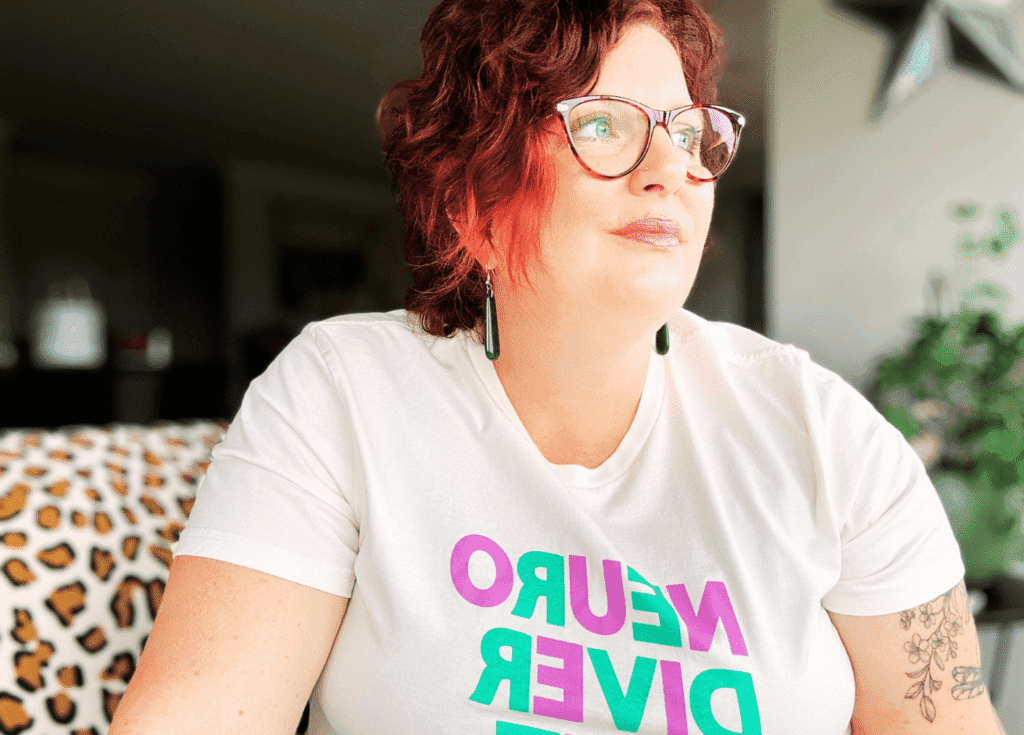Why Parenting a Neurodivergent Child in Burnout Can Feel So Hopeless
I’m having one of those weeks where nothing I do seems to work, and my mind has turned into a relentless critic—loud, mean, and exhausting.
As this happens, hopelessness rolls in like a heavy black cloud. It presses down until all I want to do is curl up under the blankets and disappear for a while.
And then I remind myself…
I am not alone…
Parenting is hard for everyone!

For so many of us raising a neurodivergent child in burnout, nothing prepares us for the sheer emotional labour it demands.
It’s everything all at once—the constant meltdowns, the never-ending worry, the soul-deep exhaustion, the pressure that doesn’t ease, the judgment from others. And layered on top of that is the work no one sees: the reparenting of ourselves, the unlearning, the research, the endless questioning, and the quiet grief over choices we made in what now feels like another lifetime.
If you’re feeling this too, then welcome, my friend.
Let’s set it down together, even just for a few moments, and carry the weight side by side.
What’s Really Happening Beneath the Surface
According to Brené Brown
Despair is a sense of hopelessness about a person’s entire life and future. When extreme hopelessness seeps into all the corners of our lives and combines with extreme sadness, we feel despair…theologian Rob Bell defines despair as “the belief that tomorrow will be just like today.” We can’t figure a way out of or through the struggle and the suffering.
And that makes sense. When we have experienced significant traumas in our parenting journeys (like so many parents of neurodivergent kids do), we can reach a space where it feels like things will always be this way.
I am a firm believer that our emotions are always trying to serve us in some way. Our emotions are messengers there to give us information about our current internal state.
So what is our hopelessness trying to tell us?
It could be one or all of these things.
Reason One: Your Nervous System is Trying to Protect You
When you begin trying new ways of being, like lowering demands, parenting differently, or tending to your own burnout, you’re asking your nervous system to cross a bridge.

On one side is the familiar land of old patterns: perhaps critical self-talk, high expectations, or parenting scripts handed down through culture and family. Even if those patterns weren’t serving you, they were known. They felt predictable, and therefore safe – the well-worn path.
Stepping onto the bridge into unfamiliar territory feels shaky and uncertain. Your nervous system may throw up resistance in the form of hopelessness.
Sometimes hopelessness acts like a shield: “If I stop hoping, maybe I won’t be disappointed.” It’s not proof that you’re failing—it’s your body’s attempt to protect you while you’re crossing into something new.
And there’s another layer: hopelessness can sound the alarm when you move away from the “good parent” narrative. Crossing that bridge means doing things differently, opening yourself up to misunderstanding and judgment, both from others and from the harsh inner critic inside. These fears can stir shame, guilt, and despair, making the bridge feel even more precarious.
But here’s the truth: the bridge is already beneath your feet, and step by step, you are building new ground on the other side.
How Safe Does Your Nervous System Feel About Parenting Differently? Take This Quiz To Find Out
Reason Two: You Are Exhausted
And then, underneath it all, there is the simple truth that you are exhausted.
Not just tired from a bad night’s sleep, but the bone-deep weariness that comes from living on high alert for too long.
Your nervous system has been running a marathon without rest, managing meltdowns, making endless micro-decisions, pressure from all directions, scanning for judgment, and carrying invisible grief.
Hopelessness isn’t just resistance; sometimes it’s the cry of a body and mind that are utterly spent. When exhaustion takes hold, it can paint everything in shades of despair, making it harder to see progress, harder to believe change is possible.
Exhaustion, as heavy as it feels, can also be a messenger. It’s your body’s way of saying: “I cannot keep sprinting; I need to rest.”

Instead of seeing this weariness as weakness, you can view it as an invitation, a call to slow down, soften, and allow yourself the same compassion you would give your child.
Rest and gentleness aren’t indulgences; they are the fertile ground where healing and breakthroughs take root. Sometimes the most courageous thing you can do is to stop, breathe, and let yourself be held by the moment.
Reason Three: Growing Pains
One thing that surprised me was the amount of work I would have to do on myself as a parent. It’s deep transformational work.
Many people who are deep into healing and transformation find themselves standing in a liminal space: the in-between where the old ways no longer hold, and the new ways haven’t yet taken root. It can feel like the caterpillar that has entered the chrysalis and turned to goo. This feeling of being ‘in between’ is incredibly uncomfortable.
Hopelessness can be a significant symptom or component of prolonged grief. There is grief in loosening our grip on old ways of being, the habits, beliefs, and even relationships that once held those patterns in place. The internal work of walking the winding path through burnout can feel unbearably heavy at times.
Francis Weller captures this truth so beautifully when he reminds us:
Grief is a threshold emotion. When we step across that threshold and enter the room of grief, it has a way of opening up the rest of our life.
Though he speaks of grief, the image applies beautifully to burnout recovery—hopelessness, collapse, and disorientation are like being on that threshold, which paradoxically opens toward emergence.
In burnout recovery, this is sometimes the moment when clarity starts breaking through, but only after we’ve allowed ourselves to truly see and accept that the old way isn’t working.
Important: If you suspect that you may be experiencing depression or you are struggling with your mental health, please seek the support of a medical professional.
What Helps Parents Move From Hopeless to Hopeful
Hopelessness does not mean that you are failing as a parent. Like any emotion, it won’t last forever.
Sometimes it’s a sign you’re close to letting go of what was never yours to carry, the unrealistic demands, the shame, the scripts of “what a good parent should do.” The surrender of these things can be the soil where breakthrough begins.
Feeling hopeless doesn’t guarantee a breakthrough is coming tomorrow, but it does mean that you could be brushing against the edges of what needs to change.
If you can find a way stay with yourself in compassion and curiosity here, and with support from a community, coach or therapist, you’re much more likely to find that this can be the doorway to something new.

Getting Support as a Parent of a Neurodivergent Child
It’s not your fault if this feels hard. Your nervous system is simply trying to protect you because you are doing something incredibly brave that you haven’t experienced before.
One thing I’ve learned, both through my own parenting journey and in walking alongside hundreds of other parents, is this: we can only adapt our parenting to the level that our nervous system feels safe with.
How Safe Does Your Nervous System Feel With Changing How You Parent? Take the quiz to find out
This is why parenting change is so much easier when it happens in a community that understands you.
Co-regulation, shared experiences, and being witnessed in your struggles help your brain and body feel safer. In a community, you don’t just carry the weight alone; you borrow nervous system safety from others. This allows you to make changes with more ease, stay consistent, and feel more confident in your parenting decisions.
That’s what we do inside, From Burnout to Balance, a parent support system for parents navigating the terrain of burnout recovery alongside their children.
By joining this community, you are stepping into a movement built on:
- Nervous system safety — because calm parents create safe homes.
- Low-demand parenting — because compassion opens more doors than control.
- Repair and reconnection — because ruptures are inevitable, but healing is always possible.
- Grief as sacred — because loss and love are forever intertwined.
- Community-centred support — because no parent should walk this path alone.
- Reparenting ourselves — because our healing ripples outward.
- Practical, soul-deep resources — because both the head and the heart need care.
This isn’t about “fixing” your child. It’s about freeing your whole family.
If you have been craving the steady support that only a community can give you, I invite you to join us in From Burnout to Balance.
Start your 7-day free trial
The Person Who Wrote This Blog
Hi, I’m Tanya Valentin, an AuDHD parent, family coach, author, and podcaster. I guide parents of Autistic and ADHD kids through burnout recovery using a neuro-affirming, trauma-informed approach.
As a parent of three autistic teens, I know firsthand how isolating and exhausting this journey can be. That’s why I created From Burnout to Balance, a space where parents can find real, practical answers to help their child recover from burnout and a supportive community, so no parent has to navigate it alone.

